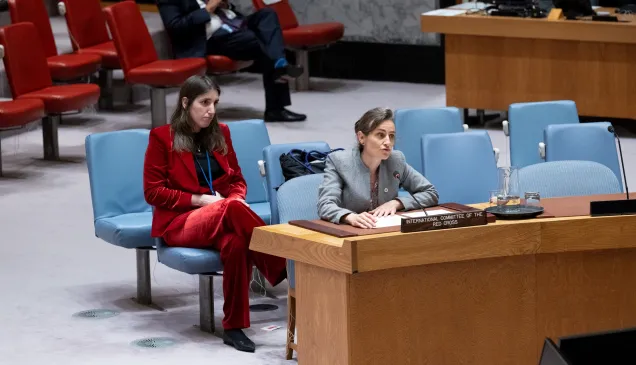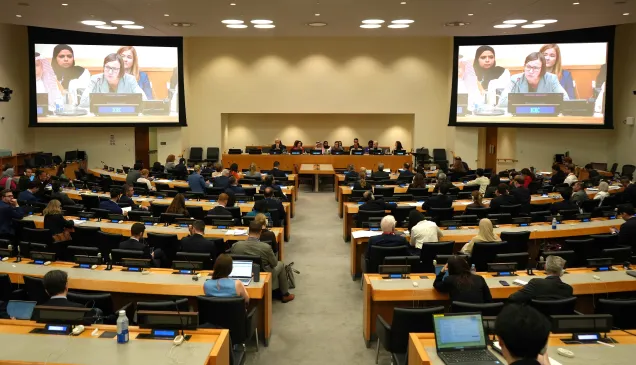Speech given by Mirjana Spoljaric, President of the International Committee of the Red Cross. Columbia University Law School – 3 March 2023
Ladies and gentlemen, dear colleagues,
Five months ago, I commenced as president of the International Committee of the Red Cross.
It is a privilege and a challenge to lead this organisation through this moment in history:
At a time when the international armed conflict between Russia and Ukraine is dominating political dynamics.
At a time when armed violence in over 100 situations across the globe continues with protracted levels of destruction and suffering.
Worldwide, we are experiencing a time of re-emerging divides.
Conflicts result in a denial of humanity – based on race, religion, class, gender.
They are reversing hard-won gains in human development, including in gender equality.
It is no coincidence that as the rights of women and girls decline, violence rises. Where conflict persists, equality for women and girls is eroded.
As the first female president in the 160-year history of the International Committee of the Red Cross, I am frequently asked for my perspectives on these issues.
Today, I want to share my initial thoughts.
The International Committee of the Red Cross is an independent, neutral organization that works across the globe to alleviate suffering in conflict and other situations of violence. It has a mandate from states and the Geneva Conventions to promote respect for international humanitarian law.
These laws ensure there is a minimum level of humanity in conflict. In short, they say: Do not target civilians or humanitarian workers; Do not rape, torture or execute people; Do not target hospitals or schools; Do not use illegal weapons; Do not discriminate against persons in your power.
This is the baseline to which warring sides must be accountable. But even these minimum standards are flouted in many conflicts.
Over the last months I have visited the ICRC's operations in Ukraine, Syria, Ethiopia, and Mali to listen to communities who are living daily with the impacts of conflict.
It is clear that when international humanitarian law is broken, it is civilians who suffer. And – civilians who are already marginalised or powerless in societies suffer the most.
On a recent visit I witnessed the grim – and compounding – horrors faced by women in conflict:
In a clinic that was barely functioning: several young women, former soldiers who had been recruited to fight, were critically injured with severe wounds that required amputation.
But not only: they had suffered rape, were pregnant and faced the prospect of giving birth where medical treatment was next to absent. Because of stigma and shame, they were ostracised from their families.
The sheer desperation of this situation is shocking.
But this is the face of women in war. A face that is too often ignored and under-represented.
Why is it that militaries will often have figures for those killed or injured; but there are no reliable numbers on instances of sexual violence in conflict?
That we cannot openly and factually speak of these issues allows these crimes to continue unabated.
The gendered impacts of conflict have been increasingly recognised in international fora, including several events to be held here in New York in the coming week - the UN Commission on the Status of Women and the Women, Peace and Security agenda of the UN Security Council.
The International Committee of the Red Cross sees these impacts in our operations:
- In conflict settings, women die giving birth.
- Girls are absent from schools at higher rates than boys. They are sold or forced into marriage as families make choices about how to survive, or even who will survive.
- Women are likely to have fewer financial resources to cope with injury, property damage and loss of income. They face additional barriers to accessing health care.
- Women are less represented in decision-making roles regarding humanitarian aid delivery.
- Sexual violence remains endemic in conflict, disproportionately impacting women and girls, ruining lives and dignity.
Gender inequality holds women and girls back the most, but it harms everyone – boys recruited to be fighters; those targeted for their sexual orientation or gender identity.
How can we turn the corner towards the universal values of humanity, dignity and equal rights for every human being?
There are several possible avenues.
First, international humanitarian law lies at the heart of protecting all victims of conflict. This means that diverse women, men, boy and girls are protected equally.
I cannot stress enough: Warring parties have the power to inflict or alleviate gendered impacts. It is states and weapons bearers who wield violence, make decisions, and dispense resources.
Consequently, they also have the power to prevent inequalities rising in societies.
Respect for international humanitarian law will improve the situation of all people, of all genders, affected by armed conflict. It will prevent the enormous harm resulting from violations of its rules, and it will help to rebuild stability and reconcile societies.
Very importantly, international humanitarian law contains the principle of non-discrimination. In its application, discrimination based on race, colour, gender, religion, wealth, or on any other similar criteria is prohibited.
Yet, effective implementation of this obligation demands dedicated resources and technical expertise by those who take decisions in war.
This requires the political will of state parties to the Geneva Conventions to assess their own conduct – and to seriously examine whether their fighting forces are equipped to take the protection of the whole civilian population into account, including those most at risk, often women and girls.
The International Committee of the Red Cross has been convening military practitioners, humanitarians, and academia on the topic of gender and international humanitarian law to examine questions including:
- How might military conduct expose people to risks of sexual violence?
- How might their conduct during occupation entrench inequalities?
- How are their detention facilities run to accommodate women?
First of all, when states make a specific commitment to incorporate a gender perspective into the application and interpretation of IHL, then things begin to change. Yet only a handful of states have made this commitment explicit.
Gender data gaps and gender bias in the planning and conduct of military operations are also barriers to progress.
Having women at the table makes a difference in this respect - their meaningful participation in the interpretation and application of IHL brings a broader scope of information into view. Having advisers with gender expertise available to Commanders is also key.
Second, increasing levels of gender inequality are a warning bell that we must heed. The greater the inequality, the greater the instability and the likelihood that conflict erupts or intensifies.
The evidence is clear: peace becomes achievable when everyone is equally respected, is free from physical and mental harm, and has full access to economic opportunities.
In this same logic, gender equality is a marker of peace and security.
An analysis of the impact of gender inequality and gender norms is relevant to understanding the likelihood of the outbreak of civil or international violence; the likelihood of success of negotiated peace agreements; and even to understand ties to extreme violence.
Often, women are absent or a minority among the decision-makers conducting war.
Despite the deadly and disproportionate impacts of conflict on women, the topic of gender is relegated to an afterthought – perceived as unpalatable or irrelevant in rooms seized of the urgencies of war.
Yet, what happens before and during conflict affects the outcome of conflict.
If women are absent in the labour market, have no access to healthcare when they are wounded or sick, if they must live with the physical and mental scars of sexual violence, if they are impoverished, how will they take their seat at the table?
It is therefore vital that women are not just at the table to make up the numbers – but are empowered to represent their communities.
Only those who control assets will, at the end of the day, have influence when important decisions are made.
Third, we must all do our part.
Thorns of gender inequality are embedded in structures, institutions, and individuals. That means in our homes, our workplaces, our battlefields.
Each of us has a role to play in challenging our own assumptions about where the roots of this problem have taken hold.
I spoke of the power of states and parties to conflicts earlier as actors who can inflict or alleviate suffering.
While they bear the responsibility to respect international humanitarian law and create lasting solutions, humanitarian organisations also have power and responsibility to address the suffering that flows from gendered impacts and inequalities.
The International Committee of the Red Cross works in accordance with fundamental humanitarian principles that provide an ethical and operational framework for action; it is respect for these principles that informs the way we integrate a gender perspective in our work.
The principle of humanity, which is the raison d'être of the humanitarian endeavour, requires the ICRC to protect life, ensure respect for the human being, and prevent and alleviate human suffering wherever it may be found.
Of course, we can only meaningfully respect the principle of humanity if we continuously reaffirm the rights and dignity of all.
Following, the principle of impartiality means that we seek to alleviate suffering on the basis of need alone.
We cannot respect impartiality without a gender lens: it allows us to see and understand the vast and diverse humanitarian needs of the people with whom we work. This has been a critical gap in our work, and one we have yet to fully close.
The humanitarian sector first began to focus on the needs and experiences of women as distinct from those of men from the late 1980s. The prevailing assumption before then was that humanitarian action could be designed and delivered 'outside' of gender norms and dynamics.
It is quite the opposite today. It is now clear that responses that fail to take gender inequality into account are likely to reinforce gender-based discrimination and other harms.
At the centre is the meaningful and dignified access and participation of crisis-affected people. We are re-focussing so that women, like men, are recognized as active agents and the primary experts in their lives.
Women and girls must be seen, heard, and more able to influence and contribute to decisions and actions that affect them, starting with our humanitarian programs.
A third important principle that the International Committee of the Red Cross follows is the principle of neutrality.
The ICRC's commitment and adherence to neutrality means that we do not take sides in conflict and we maintain contact with all warring parties.
Neutrality is a practical tool that allows us to negotiate access to populations affected by conflicts in the most hard-to-reach places. It allows us to win the trust of the population and operate safely in territories on both sides of the hostilities.
As a neutral organization we do not take a stand on political, military, or ideological matters. This has never prevented us from seeking to reach and alleviate the suffering of people affected by armed conflict, and the harms they face shaped by political and power dynamics.
The ICRC has come to better understand the pervasive and damaging impact that gender inequality has in conflict settings. We see how important it is to design our programs to address it.
The bottom line is that responses that fail to take gender inequality into account are likely to reinforce gender-based discrimination and other harms.
Humanity, impartiality and neutrality. Taking these three principles together means that we take the side only of the victims of armed conflict and violence, whether men, women or children, and work to address the gendered impacts of conflict in accordance with our commitment to humanity.
It is not straightforward: We bring with us gender norms in our organizational culture and staffing.
How we choose to use our own power will influence gender norms and dynamics in the communities where we work. Who do we hire? Who do we consult in the community about their most urgent needs?
It is our responsibility to ensure we are not – even inadvertently – exacerbating the disadvantages for women, girls and others who are marginalized.
This is what it means for us to 'do no harm', and it is the condition that we remain a credible and trusted humanitarian organization for those we serve.
Ladies and Gentlemen, dear students,
I will conclude with a reflection on where we stand today.
On the current trajectory, it is estimated that it will now take 132 years to close the gender gap worldwide.
These gaps related to economic and political empowerment, education attainment and health and survival, are particularly deep in the conflicts where the ICRC works.
Violations of international humanitarian law exacerbate them.
Respect for international humanitarian law by warring parties is required to prevent the gender gap from opening wider.
There will be no humanity, dignity, and peace until IHL is upheld for people of all genders. International security can only ever be human security, and that is security of diverse men, women, boys and girls alike.
As the president of the International Committee of the Red Cross I will always insist that respect for international humanitarian law is the only way to preserve a minimum of humanity and ultimately pave the way back to peace and prosperity.
In this, one equation is straightforward: the respect of international humanitarian law means respect for the dignity of women and men equally.
The protection of those faced with the greatest discrimination and dehumanization – very often, women and girls – lies at the heart of respect for the law as a pathway to peace.
Thank you.



